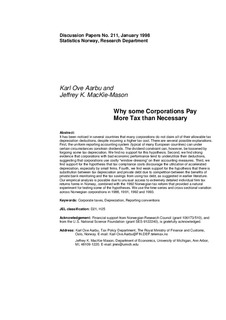Why some corporations pay more tax than necessary
Working paper

Åpne
Permanent lenke
http://hdl.handle.net/11250/180099Utgivelsesdato
1998Metadata
Vis full innførselSamlinger
- Discussion Papers [1003]
Sammendrag
It has been noticed in several countries that many corporations do not claim all of their allowable tax
depreciation deductions, despite incurring a higher tax cost. There are several possible explanations.
First, the uniform reporting accounting system (typical of many European countries) can under
certain circumstances constrain dividends. The dividend constraint can, however, be loosened by
forgoing some tax depreciation. We find no support for this hypothesis. Second, we find strong
evidence that corporations with bad economic performance tend to underutilize their deductions,
suggesting that corporations use costly “window-dressing” on their accounting measures. Third, we
find support for the hypothesis that tax compliance costs discourage the utilization of accelerated
depreciation, especially by small firms. Fourth, we find weak support for the hypothesis that there is
substitution between tax depreciation and private debt due to competition between the benefits of
private bank monitoring and the tax savings from using tax debt, as suggested in earlier literature.
Our empirical analysis is possible due to unusual access to extremely detailed individual firm tax
returns forms in Norway, combined with the 1992 Norwegian tax reform that provided a natural
experiment for testing some of the hypotheses. We use the time-series and cross-sectional variation
across Norwegian corporations in 1988, 1991, 1992 and 1993.
Keywords: Corporate taxes, Depreciation, Reporting conventions